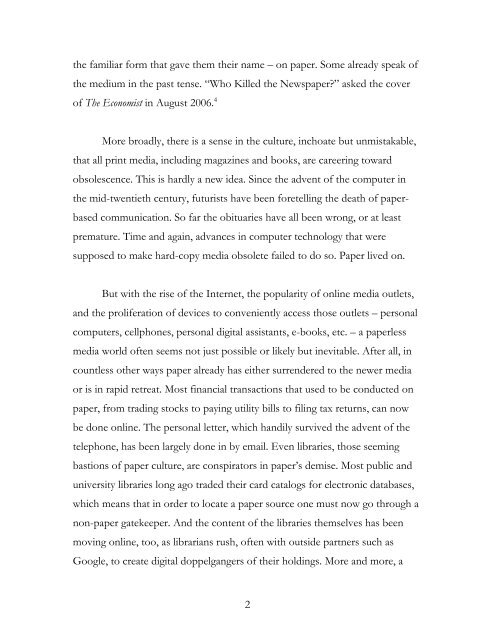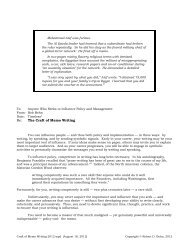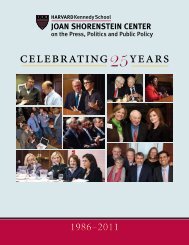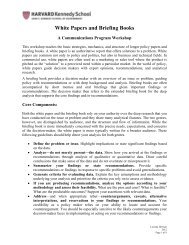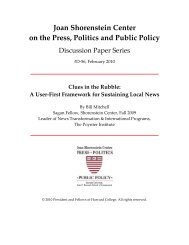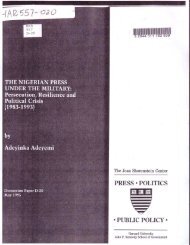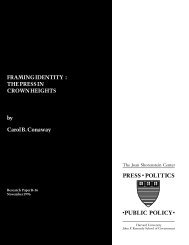Why Paper Is Eternal - Joan Shorenstein Center on the Press ...
Why Paper Is Eternal - Joan Shorenstein Center on the Press ...
Why Paper Is Eternal - Joan Shorenstein Center on the Press ...
Create successful ePaper yourself
Turn your PDF publications into a flip-book with our unique Google optimized e-Paper software.
<strong>the</strong> familiar form that gave <strong>the</strong>m <strong>the</strong>ir name – <strong>on</strong> paper. Some already speak of<br />
<strong>the</strong> medium in <strong>the</strong> past tense. “Who Killed <strong>the</strong> Newspaper?” asked <strong>the</strong> cover<br />
of The Ec<strong>on</strong>omist in August 2006. 4<br />
More broadly, <strong>the</strong>re is a sense in <strong>the</strong> culture, inchoate but unmistakable,<br />
that all print media, including magazines and books, are careering toward<br />
obsolescence. This is hardly a new idea. Since <strong>the</strong> advent of <strong>the</strong> computer in<br />
<strong>the</strong> mid-twentieth century, futurists have been foretelling <strong>the</strong> death of paper-<br />
based communicati<strong>on</strong>. So far <strong>the</strong> obituaries have all been wr<strong>on</strong>g, or at least<br />
premature. Time and again, advances in computer technology that were<br />
supposed to make hard-copy media obsolete failed to do so. <str<strong>on</strong>g>Paper</str<strong>on</strong>g> lived <strong>on</strong>.<br />
But with <strong>the</strong> rise of <strong>the</strong> Internet, <strong>the</strong> popularity of <strong>on</strong>line media outlets,<br />
and <strong>the</strong> proliferati<strong>on</strong> of devices to c<strong>on</strong>veniently access those outlets – pers<strong>on</strong>al<br />
computers, cellph<strong>on</strong>es, pers<strong>on</strong>al digital assistants, e-books, etc. – a paperless<br />
media world often seems not just possible or likely but inevitable. After all, in<br />
countless o<strong>the</strong>r ways paper already has ei<strong>the</strong>r surrendered to <strong>the</strong> newer media<br />
or is in rapid retreat. Most financial transacti<strong>on</strong>s that used to be c<strong>on</strong>ducted <strong>on</strong><br />
paper, from trading stocks to paying utility bills to filing tax returns, can now<br />
be d<strong>on</strong>e <strong>on</strong>line. The pers<strong>on</strong>al letter, which handily survived <strong>the</strong> advent of <strong>the</strong><br />
teleph<strong>on</strong>e, has been largely d<strong>on</strong>e in by email. Even libraries, those seeming<br />
basti<strong>on</strong>s of paper culture, are c<strong>on</strong>spirators in paper’s demise. Most public and<br />
university libraries l<strong>on</strong>g ago traded <strong>the</strong>ir card catalogs for electr<strong>on</strong>ic databases,<br />
which means that in order to locate a paper source <strong>on</strong>e must now go through a<br />
n<strong>on</strong>-paper gatekeeper. And <strong>the</strong> c<strong>on</strong>tent of <strong>the</strong> libraries <strong>the</strong>mselves has been<br />
moving <strong>on</strong>line, too, as librarians rush, often with outside partners such as<br />
Google, to create digital doppelgangers of <strong>the</strong>ir holdings. More and more, a<br />
2


